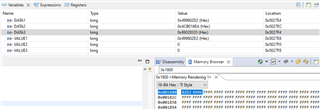Hi Experts,
Currently i am working with MSP430FR2433 to make a device like oximeter, i want to detect interrupt and increase the increment and store the value to FRAM, here i have completed to detect interrupt an enter to Low power mode but i can't write/read the data to FRAM,
i am newbie for the FRAM low power microcontrollers
i have followed below example
the above link i can't understand why they are run the below for loop
for (i = 0; i < 128; i++)
{
*FRAM_write_ptr++ = data;
}
and why they are declared the long variable as a bits like
data += 0x00010001;
My request is very simple, i have increment the long variable when interrupt is triggered..
then i store that value to the FRAM to avoid the interrupt counter values then i read the FRAM to routine increment and store
this method will help me to start the interrupt counter from old value when my controller restarted due to power or other failure..
regards
surya




